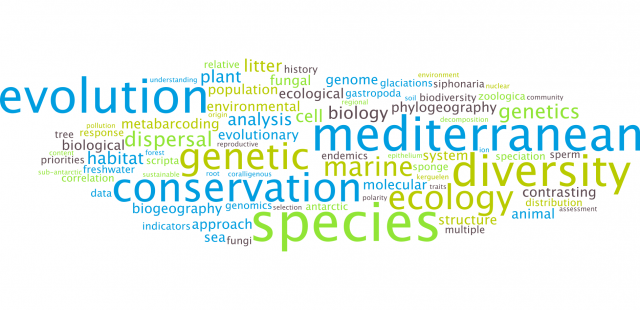OEB Research interests (T2)
Key words
Evolution, molecular ecology, evolutionary ecology, body plan evolution, molecular evolution, genome evolution, population evolution, speciation, phylogeography, evo-devo, eco-evo-devo, host-symbiot coevolution
Research Themes

We aim to explore diversity at molecular and phenotypic levels to distinguish the part of historical, biological and ecologi-cal factors in the dynamics of biodiversity. Various and complementary tools will be used such as in and ex situ experimen-tation, molecular and cellular biology, “omics”, modeling and bioinformatics. Despite the great diversity of approaches (functional genetics, genomics, population genetics, molecular evolution, evolutionary ecology, biogeography) two main axes can be defined :
• In the first axis, genetics, genomics and phylogeny approaches will be implemented in order to understand the con-sequences of environmental changes on populations and communities. This axis is thus linked with conservation biology and ecology. The Mediterranean has undergone major environmental changes since the Miocene, the team wishes to analyze genetic diversity in order to better understand the demographic history of marine and terrestrial organisms. At another scale, the team already develops studies on fragmentation, gene flow, local adaptation for example, in the context of actual modifications of landscapes and pollutions. This will be continued.
• The second field of research questions the evolution of the mechanisms implied in reproduction, development and morphogenesis in order to understand body plan diversity. In addition to fundamental interest in evo-devo, in the context of the global change, we will study, at genetic and/or epigenetic levels, the impacts of environment stress-es on developmental or phenotypical features (eco-evo-devo). To better understand long term environmental im-pacts on biological diversity and habitats, phylogenomics and phylogenetic comparative approaches will be used to integrate morphogenesis, functional features and evolutionary strategies in regard to ecological changes.
Biodiversity and evolution cannot be dissociated, thus the researches developed by our team are at the heart of major societal and ecological issues. In this context, the team OEB members will be actively involved in several federator topics of IMBE : “Biological Landscapes, Continuities and Biotic Interactions”, “From naturalist knowledge to functional and evolu-tionary mechanisms (and reciprocally)”, “Climate, global change, adaptation and resilience of living organisms” as well as in two poles, “Reproduction and Environment” and “Marine Biology and ecology ”.
Collaborations
– With other IMBE teams :
BES team
– With other labs in or near Marseille :
– With other French labs :
Montpellier : Stephen Baghdiguian (ISEM)
Paris : David Stroebel (ENS) ; Michel Vervoort (IJM) ;
– INTERNATIONAL PARTNERS :
Germany : Gert Worheide (Ludwig Maximillian Universitat) ; Detlev Arendt (EMBL), P. Poschlod (Univ. Regensburg)
Australia : Bernard Degnan (University of Queensland), Kings Park Botanic Garden
Canada : Sally Leys (University of Alberta)
Great Britain : Davide Pisani (University of Bristol)
Programs
ANR Project DYNAMIC
International Project for Scientific Cooperation (PICS, CNRS) STRAS
LIFE European Project Habitats Calanques
Cigesmed Project
Devotes Project
SeAMoBB Project
Epiecosys
Impomed
June
Publications
All the most recent publications of the team (2016-) can be found in the Open archive HAL : https://haltools.archives-ouvertes....




